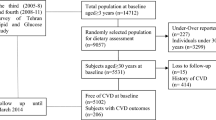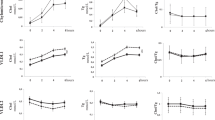Abstract
Objective: To evaluate the effect of an increased dietary intake of fruit and vegetables on susceptibility of LDL to oxidation in smokers and nonsmokers. Design: A descriptive and prospective study. Setting: Joseph Fourier University, Grenoble. Subjects: Volunteers were age and sex matched in the smoking and nonsmoking groups and were recruited by announcement. Interventions: Increased intake of fruits and vegetables for two weeks providing 30 mg/day of carotenoids. Main outcome measures: Circulating levels of beta-carotene, lutein, lycopene, α-tocopherol; susceptibility of LDL to oxidation. Cu-Zn superoxide dismutase (Cu-Zn SOD), and Se glutathione peroxidase (Se-GSH-Px) activities and reduced (GSH) and oxidized (GSSG) glutathione. Results: At entry (week 0: W0) smokers exhibited a lower plasma carotene level but the plasma parameters of oxidative stress and LDL oxidizability were not different from nonsmokers. After two weeks of increased intake of fruits and vegetables the circulating levels of carotenoids increased in smokers 23% and 11% in nonsmokers. At the same time the resistance of LDL to oxidation increased by 14% in smokers (P≤0.05) and by 28% in nonsmokers (P≤0.025). The mean whole bloodGSH level was higher in smokers at entry but returned to a concentration similar to nonsmokers at the end of the study. Conclusion: This pilot study indicates that an increased, carotenoid rich food intake through its inhibitory effect on the susceptibility of LDL to oxidation may be an interesting approach to reduce the risk of atherosclerosis both in smokers and nonsmokers. Sponsorship: This research has been supported by the European Union: AAIR project (AIR2-CT93-0888, DG 12SSMA).
This is a preview of subscription content, access via your institution
Access options
Subscribe to this journal
Receive 12 print issues and online access
$259.00 per year
only $21.58 per issue
Buy this article
- Purchase on Springer Link
- Instant access to full article PDF
Prices may be subject to local taxes which are calculated during checkout
Similar content being viewed by others
Author information
Authors and Affiliations
Rights and permissions
About this article
Cite this article
Hininger, I., Chopra, M., Thurnham, D. et al. Effect of increased fruit and vegetable intake on the susceptibility of lipoprotein to oxidation in smokers. Eur J Clin Nutr 51, 601–606 (1997). https://doi.org/10.1038/sj.ejcn.1600451
Received:
Revised:
Accepted:
Issue Date:
DOI: https://doi.org/10.1038/sj.ejcn.1600451
Keywords
This article is cited by
-
Disease Prevention and Treatment Using β-Carotene: the Ultimate Provitamin A
Revista Brasileira de Farmacognosia (2022)
-
Associations between fruit and vegetable, and antioxidant nutrient intake and age-related macular degeneration by smoking status in elderly Korean men
Nutrition Journal (2017)
-
No effect on oxidative stress biomarkers by modified intakes of polyunsaturated fatty acids or vegetables and fruit
European Journal of Clinical Nutrition (2008)
-
Age-related oxidative stress and antioxidant parameters in middle-aged and older European subjects: the ZENITH study
European Journal of Clinical Nutrition (2005)
-
Effects of enhanced consumption of fruit and vegetables on plasma antioxidant status and oxidative resistance of LDL in smokers supplemented with fish oil
European Journal of Clinical Nutrition (2003)



